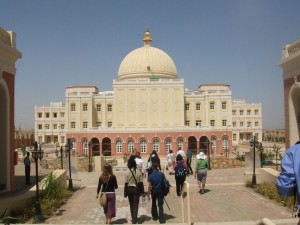
By Sameh H. Soror, PhD
Science and innovation in Egypt initiated, when mankind began to populate the valley of the Nile. Ancient Egyptians were leaders in scientific discoveries and innovation, which turned Egypt into the world cradle of civilization.
Throughout history, Egyptian scientists have contributed to the advancement of science and to the foundation of different sciences, such as astronomy, chemistry, medicine and engineering. Many of their achievements remain enigmas, like the construction of the pyramids and the practice of mummification, and so on and so forth.
Egypt’s contributions towards science and technology, are not restricted to ancient Egyptians’ achievements. During the middle ages and the
Islamic civilization, many Muslim scientists, who made major contributions to human knowledge, were working in Egypt. These include giants such as Ibn al-Haytham, Ibn Al-Nafis and others. Cairo, along with Bagdad and Damascus, were acting as Mecca for the European researchers.
In more recent decades too, Egypt has given birth to many prominent scientists, whose contributions to science and technology, have added immense value to our knowledge. Examples of these include, Mustafa Meshrafa, Ahmed Zewail, Farouk El-Baz, MagdyYakoub, Moustafa El-Saayed and many others.
Ahmed Zewail once wrote in an article in an Egyptian newsletter (AlmasryAlyoum, August 2011),
“We do not want to just take pride in our history, but we need to work in order to shape the future, that Egypt deserves.” It is painful but true, that science and technology in Egypt has had an insignificant impact on Egyptian life and society – particularly in the modern times. Egypt, who lead the world of science and innovation in the old ages, is suffering from illiteracy and knowledge deficiency today. If we aim to understand the reasons behind this phenomena,we need to briefly explore the current state of science, technology and innovation (STI), in Egypt.
The recent global competitiveness report for 2013-2014, produced by the World Economic Forum (WEF), offers a distinctive summary of the major challenges facing STI development in Egypt. According to the report, Egypt’s primary education ranked last in its list of priorities and development initiatives. Looking at it from this lens, it is all too obvious why science is in such a bad state in Egypt today. How can one do good science without receiving a good education. Farouk El-Baz has famously said: “The way for real development lies in education.”
The low quality in education, unfortunately, is not limited to primary education, but lasts through different stages of education, including,the university level. The number of university students, exceeds the capacities and resources available in Egyptian universities, which in turn, is reflected in the quality of its graduates. Universities direct their already limited resources, towards education, and hence, research lies low on their priorities. Research centers, as a result, are major victims of deterioration, owing to the paucity of resources.
In addition, tenure contracts, not particularly linked with performance, applied in all Egyptian universities and research centers, cause  de-motivation and kill the competition, among staff and researchers.
de-motivation and kill the competition, among staff and researchers.
Another major issue is, that laws governing the STI in Egypt, are outdated and hinder scientific development in the country. The applied laws do not allow importing some scientific ingredients, which are essential for advanced research, for e.g. cell lines, and do not allow the formation of spin off companies in the universities. Assessment and promotion rules are extremely unfair and do not support innovation, interdisciplinary and multidisciplinary research, which negatively affects the quality of produced research.
The system in Egypt depends solely on seniority and does not give a chance for young talented scientists to play major roles. Prof. Farouk El Baz, in his plenary lecture in Biovision (Bibliotheca Alexandria, 2014) was of the opinion, that Egypt’s future depends on young people, and while directing his words towards the youth, he said, “Only you are capable of shaping the future.”
Nevertheless, there is always light at the end of the tunnel. Egypt is replete with bright minds and skillful scientists. There are increased funds for research, owing to the science and technology development fund (STDF). One of most important program run by STDF, is the establishment of centers for scientific excellence, with funds up to 10 million Egyptian pounds. “The ‘Centers of Scientific Excellence Initiative’, represents the conviction of Egypt, that science is the way forward”, said Prof Mahmoud Sakr, the executive director of STDF and newly appointed president of the Academy of Scientific Research and Technology (ASRT).
There are several agreements between Egypt and several international partners, for funding collaborative projects through the STDF and the ASRT, for e.g. EU, Germany, USA, France, Tunisia, South Africa etc. There is also great hope, that the Zewail City for Science and Technology (established by the Egyptian Noble laureate, Ahmed Zewail), will play a major role,to drive research and technology in the country forward. NGO’s in Egypt, like ‘Misr El kheir’, have recently begun to invest heavily in STI and created several programs supporting scientific research and entrepreneurship. The community in Egypt should encourage more NGO’s to follow this path.
In the end, the main problem for science and innovation in Egypt, is not the funding, but the system of STI and how it is operated. In my opinion, pouring more funds for research is important, but it will remain useless, unless we make a general reform for the STI system and rectify the laws that govern scientific research in Egypt. In addition, enabling young scientists should become the first priority, as young scientists represent the future of the country and house the required skills and expertise, to solve the county’s problems.
The Author is an Associate professor of Biochemistry and Molecular Biology, Head of center for scientific excellence “Helwan Structural Biology Research” (HSBR) and Co-chair of the Global Young Academy (GYA), Helwan University, Egypt.
References:
1. Farouk El baz – ‘Biovision plenary lecture’ in Youm7: http://www1.youm7.com/News.asp?NewsID=1600585#.U0t53F65MpE
2. Ahmed Zewail – ‘Science is future bridge’ in Al masary Elyoum (Arabic article): http://www.almasryalyoum.com/news/details/105345
3. Mahmoud Sakr – Youm7: http://www.youm7.com/News.asp?NewsID=957620#.U0t6-F65MpE
4. Global competitiveness report: http://www3.weforum.org/docs/WEF_GlobalCompetitivenessReport_2013-14.pdf
You must be logged in to post a comment.